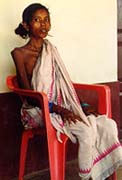The Rediff Special/A V Ramani
A death in the dispensary
 Subhashi died quetly and without a fuss. This 30 year old woman from Tinighoria village in the Kerandimal hills of southern Orissa had been
coughing for six months before she was brought to our little dispensary.
Too ill to walk, weakened by anaemia which caused her feet to swell up, she
had an air of calm acceptance about her. As if to say, I'm ready for
whatever life has in store for me.
Subhashi died quetly and without a fuss. This 30 year old woman from Tinighoria village in the Kerandimal hills of southern Orissa had been
coughing for six months before she was brought to our little dispensary.
Too ill to walk, weakened by anaemia which caused her feet to swell up, she
had an air of calm acceptance about her. As if to say, I'm ready for
whatever life has in store for me.
A jeep was returning to Mohuda from a field trip. Her husband and daughter
brought Subhashi to us in it. She was only skin and bone and obviously very
ill. Examination showed that her lungs were extensively damaged, probably
by tuberculosis. Her sputum showed numerous acid-fast bacilli, the deadly
mycobacterium that causes TB.
We started her on the appropriate drugs. We also explained to her husband
that she needed blood and oxygen, both of which we did not have. They were
only available at the large medical college and hospital in Berhampur,
about 10 km away. But he was adamant: he did not want to take her there. He
seemed to feel that he had wasted enough time and effort already, bringing
her to Mohuda. "I would not have brought her if the villagers had not
forced me to," he grumbled.
Subhashi was extremely cold, and spent most of the next day in the sun. I
got somebody to take her photograph, sure that she would not recognise
herself even two months later. Anti-TB drugs act almost miraculously on a
patient. She said nothing when the picture was taken, but I could see that
she was pleased.
At 10:30 that night, Subhashi woke up to go to the toilet. Since her
husband and daughter were asleep, she walked by herself to the bathroom. By
the time she returned, she was out of breath. We had gone to check on her
just then, so we put her back in bed and propped her up. Once again, we
asked her husband to allow us to take her to Berhampur. Once more, he
refused. He said she was going to die anyway, so there was no use worrying
about her or wasting any more time and money on her. Her daughter fast
asleep beside her, Subhashi lay there and listened to both of us. I was
arguing and getting angrier; the husband remained indifferent and quite
immovable in his opinion.
Suddenly, Subhashi stopped breathing. We tried to resuscitate her, but I
knew it was futile. Anaemia and the TB had defeated her. Or was it something
else which made her give up her will to live?
Even in death, Subhashi's face wore that same look of calm acceptance. I
wondered then and still -- how did she remain so? I do not feel calm when I
think of her. Nor can I accept her needless, lonely death. Is there a
lesson I must learn from Subhashi?
A V Ramani is a MD in Community Health from the Christian Medical College, Vellore. She works for Gram Vikas, a NGO in Mohuda, Orissa.
EARLIER FEATURE:
A doctor's heartwarming account of health care in Orissa...
Tell us what you think of this feature
|







